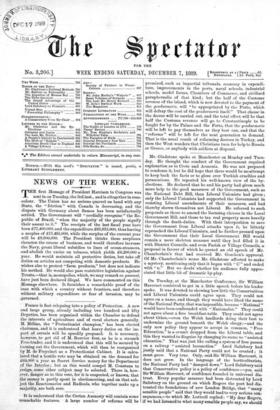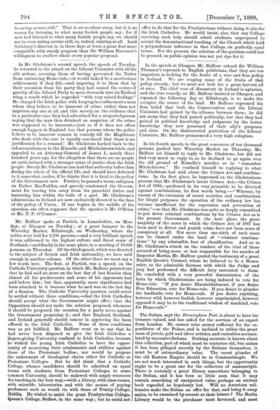On Tuesday, at the Manchester Conference, Sir William Harcourt contrived
to get in a little speech before his leader spoke. It was devoted to showing how little the Conservatives and Liberal Unionists could agree upon. They could not agree on a name, and though they would have liked the name of the National Party, that was impossible, because " National" would have been confounded with " Nationalist." They could not agree about a free breakfast-table. They could not agree about tithes,—even the Welsh landlords doing their best to undermine the ground beneath the Welsh clergy,—and the only new policy they appear to accept in common, " Free Education," is a crumb dropped from the Liberal table, and this they wanted to disguise by changing its name to " assisted education." That was just like calling a system of free passes on a railway " assisted locomotion." Lord Salisbury had justly said that a National Party could not be created ; it must grow. Very true. Only, said Sir William Harcourt, it does not grow. In the language of the horticulturists, the National Party had " damped down." Lord Salisbury said that Conservative policy is a policy of confidence :—yes, said Sir William Harcourt, of confidence founded in universal die- trust. Every popular measure had been distrusted by Lord Salisbury on the ground on which Rogers the poet had dis- trusted the foundations of new London Bridge, that " many sensible people" said that they would lead to very serious con- sequences,—to which Mr. Luttrell replied : "My dear Rogers, if we had listened to what many sensible people say, we should
be eating acorns still." That is an excellent story, but it is no reason for listening to what many foolish people say ; for if men had listened to what many foolish people say, we should not be even eating acorns still, or, indeed, existing at all. Lord Salisbury's distrust is, in these days at least, a great deal more compatible with steady progress than Sir William Harcourt's willingness to swallow.whole every popular proposal.























































 Previous page
Previous page